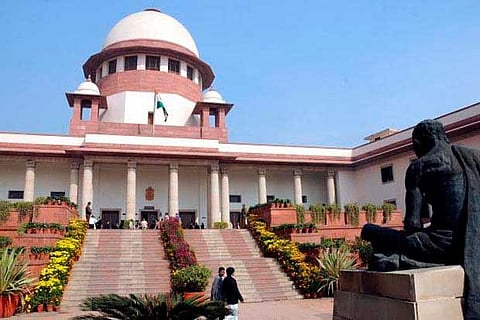

New Delhi
The top court noted the distinct degree of harm suffered by the small and marginal farmers -- having land holding of less than 5 acres -- who belong to the economically weaker sections of the society as compared to other farmers, and therefore they deserve the benefit of the scheme.
A bench comprising justices D.Y. Chandrachud and A.S. Bopanna said: "The small and marginal farmers belong to the economically weaker sections of the society. Therefore, the loan waiver scheme in effect targets the economically weaker sections of the rural population."
The bench said the purpose of providing a waiver of agricultural loans is to uplift the distressed farmers, who have been facing the brunt of erratic weather conditions, low produce, and fall in the prices because of the market conditions.
The bench further added that due to the distinct degree of harm suffered by the small and marginal farmers as compared to other farmers, it is justifiable that the benefit of the scheme is only provided to a specified class.
The Tamil Nadu government argued that consumption expenditure of marginal and small farmers exceeds their estimated income by a substantial margin, and the deficits are covered by borrowings. The bench noted that the objective of promoting the welfare of farmers as a class to secure economic and social justice is well recognised by Article 38.
"Therefore, the classification based on the extent of landholding is not arbitrary since owing to the inherent disadvantaged status of the small and marginal farmers, the impact of climate change or other external forces is unequal," said Chandrachud, who authored the judgment on behalf of the bench.
The bench noted the fact that 16,94,145 small and marginal farmers have availed agricultural loans as compared to 3,01,926 farmers belonging to the 'other' category testifies that small and marginal farmers have a significant capital deficit when compared to the rest of the farmers. The bench noted that the law or the scheme of the government cannot be tested on the anvil of majoritarian morality but only on constitutional morality.
The bench also cited data from a report showing that households having lands less than 0.01 hectare use 93.1 per cent of the agricultural loans for a non-agricultural purpose. In sharp contrast, a household that owns 10 hectares of land only uses 17.1 per cent of the agricultural loan for non-agricultural purposes.
"This depicts the poverty that envelops the class of small and marginal farmers," said the bench.
The bench noted that the scheme was introduced in pursuance of an electoral promise made by the then party in power in Tamil Nadu.
"It is a settled law that a scheme cannot be held to be Constitutionally suspect merely because it is based on an electoral promise," noted the bench.
The top court also set aside the Madras High Court judgment delivered on April 4, 2017, which held the grant of loan waivers only to small and marginal farmers to be arbitrary and directed the government to grant the same benefit to all the farmers, irrespective of the extent of landholding.
On May 13, 2016, the Tamil Nadu government had granted a waiver of outstanding crop loans issued to small and marginal farmers, and for the classification of farmers, the extent of landholding as mentioned in the landholding register and loan register at the time of sanction of the agricultural loan had to be taken into consideration.
A small farmer means a farmer who holds land of 2.5 acres to 5 acres, and marginal farmer means a farmer who holds land up to 2.5 acres. The National South Indian River Interlinking Agriculturist Association had challenged the scheme as unconstitutional for violation of Article 14 of the Constitution, and sought a direction to provide loan waiver to all farmers, irrespective of the extent of landholding.
It was argued before the high court that the AIADMK had made an electoral promise to implement the scheme, and introduced it after being voted to power.
Visit news.dtnext.in to explore our interactive epaper!
Download the DT Next app for more exciting features!
Click here for iOS
Click here for Android